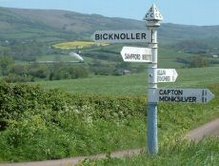 The "new" locomotive turntable at Minehead Station passed its inspection by the men from the Ministry - well, the Office of the Rail Regulator - yesterday. The freshly signed Certificate of Competence bestowed upon the massive lump of metal now permits full use. The West Somerset Railway have announced it will indeed be in use at the Winter Steam Festival on 28 and 29 December this year.
The "new" locomotive turntable at Minehead Station passed its inspection by the men from the Ministry - well, the Office of the Rail Regulator - yesterday. The freshly signed Certificate of Competence bestowed upon the massive lump of metal now permits full use. The West Somerset Railway have announced it will indeed be in use at the Winter Steam Festival on 28 and 29 December this year.News of the turntable at Minehead has appeared in the website of a Swindon newspaper - see
http://www.swindonadvertiser.co.uk/community/remember/reports/3964409.Grandfathers_led_the_way_in_rail_history/ - who are, rightly, pleased to note that the Great Western Railway built these things to last.
This one was turning steam locomotives at Pwllheli in North Wales for nigh on seventy years before falling into disuse and eventually saved for preservation by some very, very far-sighted fellows in Somerset, who moved the whole thing to Minehead in 1977. And there is lay rusty away, uninstalled and unused, until very recently when opportunity knocked, money and land became available.
The turntable was too short for the longest steam locomotives now seeing main line use again, so the thing was extended at a specialist works in the Black Country, before making its way back to Minehead and placed on its original pivot already in place in a newly constructed pit next to Minehead Station.
Civic dignatories enjoyed a day out in October when the turntable was officially "launched", with several sightings of chain-of-office officials smiling as they pushed a real live steam locomotive round and round in circles just for the cameras, and the fun too, I guess.
Yesterday's low key inspection now gives Minehead and the West Somerset Railway the right facility to attract main line steam excursions right to the seaside town. The incoming steamer can be turned to face the right way for the homeward trip (main line officials don't like steam engines running "backwards"). This avoids the previous need for a diesel locomotive to tail the incoming excursion so that it can pull the return train, and avoids the incoming steamer making a lengthy, expensive non-revenue-generating trip to the nearest turning facility (Bristol, Westbury or Yeovil).
Great news for everyone, then, it seems. Thank goodness for those far-sighted folks back in the 1970s who knew a good thing or two about railways.

No comments:
Post a Comment